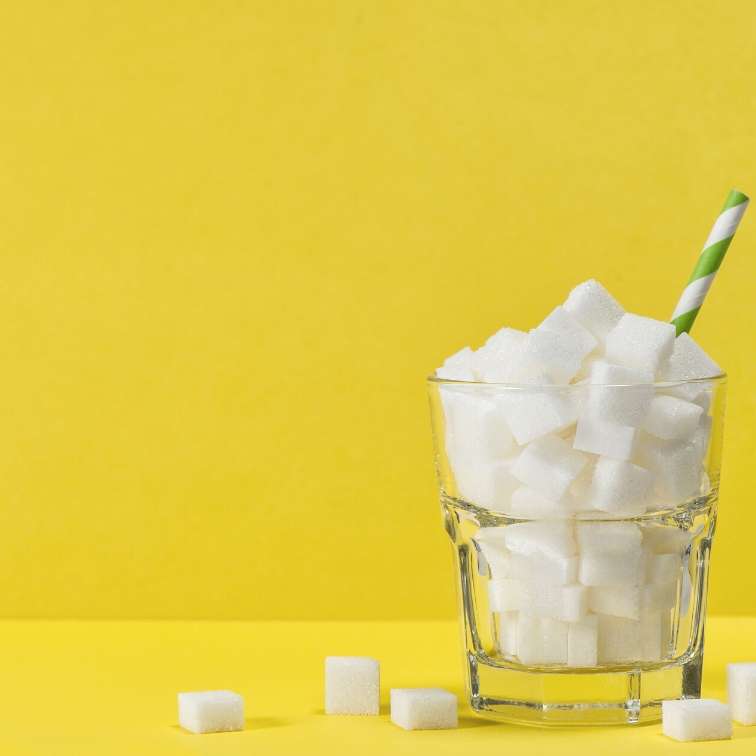
How Sugar Affects Your Training and Performance
Sugar is one of those food items that we know generally isn't good for us, but how do swimmers manage their intake when this ingredient seems to show up unsuspectingly in many things that we eat and drink all day long. Learn about how this additive can affect your swim training and some ways you can manage your sugar intake.
What does sugar do?
First of all, sugar is everywhere and it's disguised on ingredient lists as fructose, sucrose, glucose, monosaccharides, and other names, as well as the traditional sources like honey, molasses, cane syrup, and more. Therefore, it's important to be diligent about inspecting what you're putting in your mouth while you're training. Beyond just being a poor source of carbohydrates while you're training, sugar is linked to a host of diseases and health ailments including various cancers, vision problems, digestion issues, and high cholesterol. Additionally, there are short term symptoms with sugar intake that could cause you to miss a practice or a session at the gym, affecting your overall performance goals. Headaches, indigestion, heightened asthma, and constipation are just a few that can derail your daily regimen.
Why are they bad during training?
Simple sugar intake is bad nutrition for swimmers for a few reasons. One, sugar slows food's travel time through the gastrointestinal tract. This is critical for swimmers who are timing their meals around swim sessions and meets. If you're eating breakfast that's loaded with sugar, your body will not have digested it properly before you've gotten in the pool. This is what ends up causing cramps, fatigue, nauseau and a host of other issues that can sabotage your performance. Another problem with simple sugars are that they need to be mixed with weak 6-8% solutions in order to match body fluid osmolality parameters (280-303 mOsm) and be digested with any efficiency. Unfortunately, solutions mixed and consumed at this concentration only provide, at the most, about 100 calories per hour, which is not enough for maintaining energy production on an hourly basis for most swimmers. And don't plan on diluting your sugars with more fluid to get the proper concentration because this just leads to too much fluid intake, resulting in cramps, bloating, and discomfort, none of which you want to have on the day of a meet or practice! Sugar also interferes with the absorption of protein. We've discussed protein and the importance of it in previous posts and how it works to repair your muscles after a workout, so it's critical that nothing is interrupting this important nutritional step in your day.

How to reduce your intake
It's highly unlikely that as an athlete you're munching on candy and lollipops all day. But for athletes, being vigilant about your sugar intake means more than just skipping the candy bar and soda pop. Adopting a low sugar diet plan is the best strategy. You'll need to avoid those sugary sport drinks which mask the true negative affects on your body. Instead, fuel up with drinks that use complex carbohydrates like maltodextrins or glucose polymers only, with no added simple sugar as their carbohydrate source. Read labels and ensure that you're not ingesting some of the bad stuff. When it comes to your dinner plate, balance out the complex carb intake with non-starchy vegetables, like carrots, broccoli, onions and mushrooms. And definitely include different fruits in your meal plan to get sugar the natural way. Apples, strawberries, and pineapples are all good choices that have low calories per serving and a minimal amount of sugar compared to other fruits. And be selective about sweets. If you must satisfy that craving, choose foods or beverages that contribute some nutrition, such as homemade ice cream as a source of calcium, or oatmeal raisin cookies as a source of fiber.
As with everything else that you're doing to reach your performance goals, keeping an eye on your sugar intake comes with practice. But with these guidelines, you're sure to begin to make the right choices to give you that competitive edge!
Sources:
http://www.hammernutrition.com/ hnt/1273/
http://www.usaswimming.org/ ViewNewsArticle.aspx?TabId=0&itemid=6369&mid=14491
http://www.stack.com/2011/04/04/ the-truth-about-sugar-for-athletes/
http://www.ncbi.nlm.nih.gov/pubmed/ 21407126










Leave a comment
This site is protected by hCaptcha and the hCaptcha Privacy Policy and Terms of Service apply.